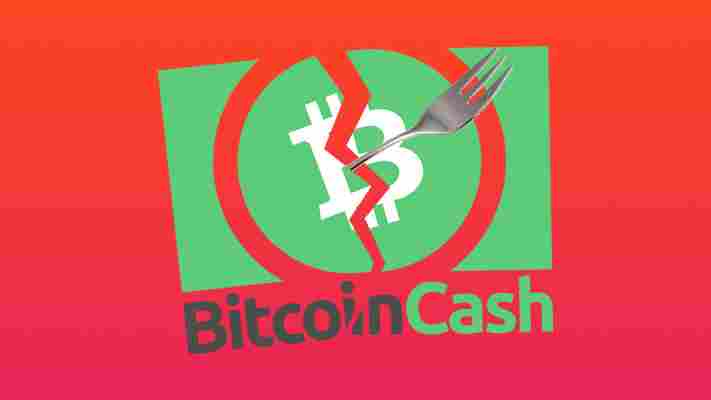Today, Bitcoin Cash (BCH) – the most popular fork of the original Bitcoin (BTC) network and the fourth largest cryptocurrency by market cap – is about to undergo a highly controversial hard fork that will split its network into two separate chains. But there is a problem: only one can remain the real Bitcoin Cash.

The split, which many consider the second most notorious hard fork since the birth of Bitcoin Cash itself, is expected to take place in about three hours. But what exactly does this mean for you and the cryptocurrency market?
Let’s find out.
The Bitcoin Cash backstory
Bitcoin Cash undergoes network updates twice a year, but the latest one is proving to be particularly divisive. Following two fundamentally different network update propositions – one developed by node software provider Bitcoin-ABC, and another one developed by Craig Wright’s blockchain research firm nChain.
While ABC’s implementation will introduce a series of new features like smart contracts and oracles (functionalities that will allow to build applications on top of Bitcoin Cash and expand its utility outside of payments), nChain’s version aims to up the block size from 32MB to a maximum of 128MB in an effort to improve scalability and transaction speeds.
How well-thought out each solution is depends on who you’re asking . But here is the conundrum: the two implementations are incompatible with each other.
As a result of this, the Bitcoin Cash blockchain is scheduled undergo a hard fork (basically, to be split in two), spurring two new cryptocurrencies: BAB (running on Bitcoin-ABC software) and BSV (running a protocol called Bitcoin SV developed by nChain).
Then there is a third – slightly more inclusive – proposal that combines the best of BAB and BSV. Bitcoin Unlimited, yet another BCH software provider, has vowed to bridge the discord between SV and nChain, and implement a solution that supports both visions .
The good, the bad, and the ugly
Other than a tremendously messy public quarrel that gives a bad name to the entire Bitcoin Cash community, the upcoming hard fork has stacked miners against each other in a full-blown hashing war.
Currently, stats from Coin Dance indicate that most miners have signalled they will support the Bitcoin SV implementation of Bitcoin Cash.
Indeed, SV leads the way with as much as 76 percent of miners intending to run its implementation, followed by ABC and Unlimited with between 15 to 26 percent support each.
While the cryptocurrency community is still making up its mind about which implementation to support, three camps have cropped up:
A number of exchange services (including the controversial Bitfinex ) have revealed they will support both implementations, giving each its own price ticker.
Others that will support only ABC or SV, and will continue to call whichever version they support the real BCH.
Then there is the group that will merely wait and weigh out which chain it makes more sense to support in the long-term.
Leading exchanges like Coinbase and Binance have revealed intentions to support the Bitcoin Cash fork, but it is unclear exactly which version of the chain they will back.
Regardless of which implementation emerges as the new ‘real’ Bitcoin Cash though, the hard fork has caused irreparable damage to the community. Other than the steep drop in price this week, the family feud between Wright and Bitcoinom boss Roger Ver has tainted the entire blockchain space.
What a shame… especially when you consider less people use Bitcoin Cash as a payment solution than Dogecoin – a cryptocurrency intentionally created as a joke.
In the meantime, Coin Dance has prepared a nifty countdown for the Bitcoin Cash hard fork. Go watch how the whole thing plays out.
Stay up to date on cryptocurrencies, blockchain technologies, and the people behind them: follow Hard Fork on Twitter .
Cryptopia needs $2M to keep a database alive – or users might never recover their tokens
Defunct cryptocurrency exchange Cryptopia warned it will take “some months at least” to figure out how to return tokens owed to its users.

Cryptopia administrators have also requested “urgent interim relief,” which they say is critical to maintain a single SQL database that stores all of its users’ individual account holdings and contact details.
“Without this information, reconciling individual holdings with the currencies held by Cryptopia will be impossible,” reads a statement posted early Monday.
Hackers forced Cryptopia offline in January after they drained $16 million in digital assets from its operational wallets. Following a failed relaunch , the exchange finally commenced the liquidation process with Grant Thornton New Zealand earlier this month.
Incredibly, Bloomberg recently reported that liquidators were worried all of its data could be overwritten or lost unless Cryptopia pays an eye-watering $2 million to the company that hosts it, an Arizona-based web services firm.
“This would be potentially catastrophic for the liquidators and account holders,” one liquidator told Bloomberg; the liquidator then confirmed that none of $16 million in tokens stolen had been recovered so far.
EOS creator Block.one to ‘participate’ in blockchain governance
EOS, the world’s fifth largest cryptocurrency, has been mired in chaos over ‘governance,’ ever since its blockchain went live earlier this month. Blockne, the currency’s parent company, is now jumping in to take control in its own hands.

Blockne will participate in the EOS block producer elections, the company announced on its website on Thursday.
For some context, EOS utilizes the delegated proof of stake (DPoS) consensus protocol developed by its CTO Daniel Larimer. There are 21 ‘decentralized bodies’ — called block producers (BPs) — elected by EOS cryptocurrency holders under the DPoS protocol. These block producers are in full control of the EOS blockchain — right from creating new blocks, hosting back-up servers to freezing accounts and ensuring abidance to the EOS constitution.
The elections of these block producers is expected to be “democratic,” given that the voting happens through the entire community. But, given how unevenly distributed the EOS token supply is — the claim seems unsubstantiated.
Blockne, for example, holds more than 100 million EOS (10 percent of total supply). The company claims that it will be a ‘minority voting member’ in the block producer elections. But, statistics contradict that.
The total voter turn out for EOS remains quite low. At the moment, about 30 percent of all EOS tokens are staked in the election process. Out of these, a significant number of votes came from cryptocurrency exchanges. Bitfinex, a cryptocurrency exchange now elected as a block producer, is also known to have voted on its behalf of its users.
If Blockne jumps in the election process, it’ll account for 25 percent of all votes staked.
Twitter user @econoar points out that Blockne could end up significantly influencing the block producer election process, if the voter turnout doesn’t increase.
It is worth noting that this decision is also a significant flip from Blockne’s earlier promise of staying out of the voting process to ensure decentralization. But, this is not the only retraction in the company’s position on how the platform should be governed.
Blockne also announced that it is in favor of scrapping the existing constitution to limit the power of EOS block producers and arbitration bodies. What makes this even more disturbing is that the amendment proposal came only weeks after the first constitution was drafted.
With these decisions in mind, it all but seems that Blockne has abandoned its not to stick its nose in the network’s governance – a promise the company made to ensure the EOS remains fully decentralized.











